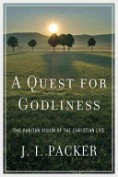Below are the last few paragraphs from a chapter entitled “The Puritan Approach to Worship” in J. I. Packer’s book A Quest for Godliness: The Puritan Vision of the Christian Life.
But still one question remains. How do we begin to get from where we are to where the Puritans show us that we ought to be in our own practice of worship? How can we, cold-hearted and formal as we so often are — to our shame — in church services, advance closer to the Puritan ideals? The Puritans would have met our question by asking us another. How do we prepare for worship?
Here, perhaps, is our own chief weakness. The Puritans inculcated specific preparation for worship — not merely for the Lord’s Supper, but for all services — as a regular part of the Christian’s inner discipline of prayer and communion with God. Says the Westminster Directory: “When the congregation is to meet for public worship, the people (having before prepared their hearts thereunto) ought all to come….” But we neglect to prepare our hearts; for, as the Puritans would have been the first to tell us, thirty seconds of private prayer upon taking our seat in the church building is not time enough in which to do it. It is here that we need to take ourselves in hand. What we need at the present time to deepen our worship is not new liturgical forms or formulae, nor new hymns and tunes, but more preparatory “heart-work” before we use the old ones. There is nothing wrong with new hymns, tunes, and worship styles — there may be very good reasons for them — but without “heart-work” they will not make our worship more fruitful and God-honoring; they will only strengthen the syndrome that C.S. Lewis called “the liturgical fidgets.” “Heart-works” must have priority or spiritually our worship will get nowhere. So I close with an admonition from George Swinnock on preparation for the service of the Lord’s Day, which for all its seeming quaintedness is, I think, a word in season for very many of us:
“Prepare to meet thy God, O Christian! Betake thyself to thy chamber on the Saturday night, confess and bewail thine unfaithfulness under the ordinances of God; ashamed and condemn thyself for thy sins, entreat God to prepare they heart for, and assist it in, thy religious performances; spend some time in consideration of the infinite majesty, holiness, jealously, and goodness, of that God, with whom thouart to have to do in sacred duties; ponder the weight and importance of his holy ordinances…; meditate on the shortness of the time thou hast to enjoy Sabbaths in; and continue musing…till the fire burneth; thou canst not think the good thou mayest gain by such forethoughts, how pleasant and profitable a Lord’s day would be to thee after such a preparation. The oven of thine heart thus baked in, as it were overnight, would be easily heated the next morning; the fire so well raked up when thou wentest to bed, would be the sooner kindled when thou shouldst rise. If thou wouldst thus leave thy heart with God on the Saturday night, thou shouldst find it with him in the Lord’s Day morning.”


